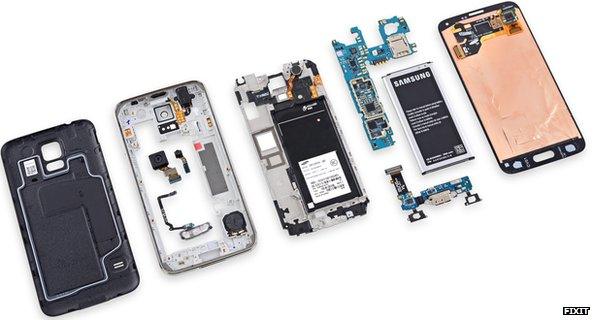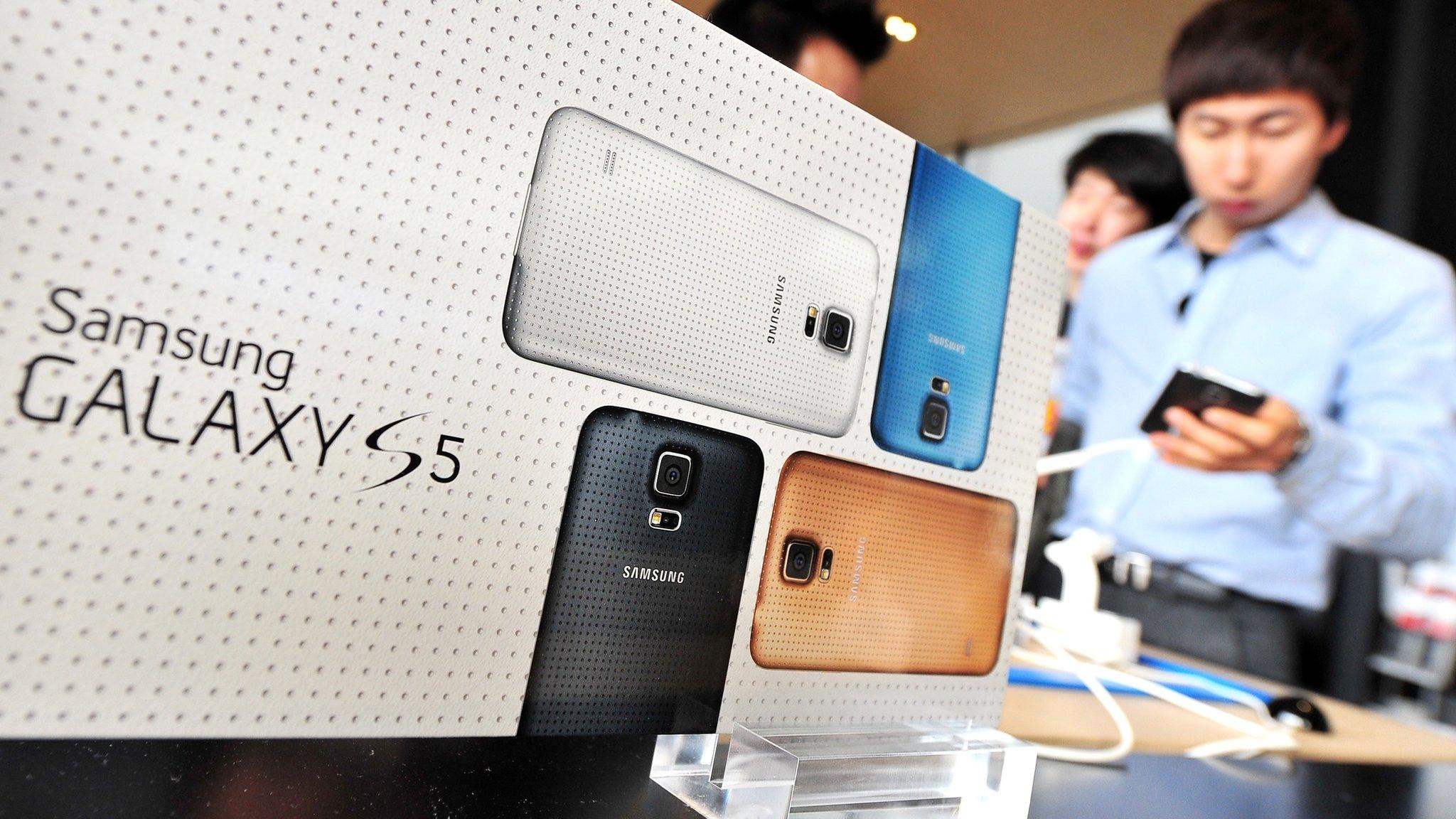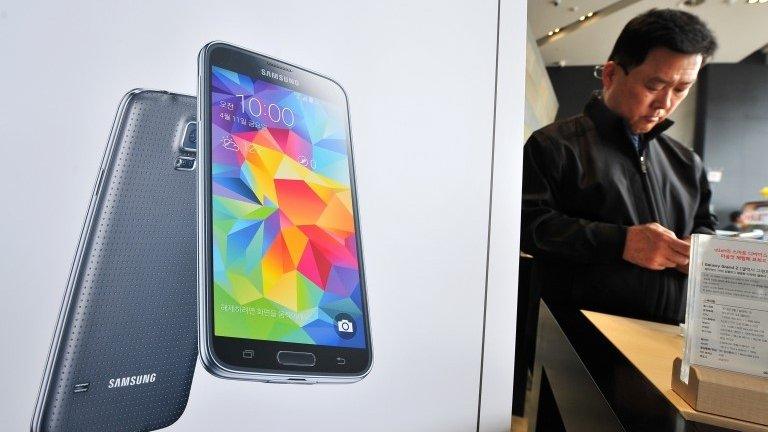Galaxy S5: Expert views on Samsung's latest smartphone
- Published
Rory Cellan-Jones tests out the Samsung S5
The Galaxy S5's new heart rate reader could come in useful for Samsung Electronic's investors.
The South Korean firm warned earlier this week that it expected its profits to fall for the second quarter running.
Several analysts suggest the high-end market is becoming saturated, meaning most people wanting a premium phone already own one, making it harder to sell them another.
"Year to date, the share price of Samsung Electronics continues to underperform both in absolute terms and against the Kospi [Korea Composite Stock Price Index] as well," Taewoo Kim, portfolio manager of Fidelity's Korea fund tells the BBC.
"This weak performance reflected investors' concerns on its smartphone business particularly in the high-end segment as a result of elevated competition."

Samsung manufactures many of the parts that appear in its new handset
But Mr Kim believes things are about to improve, thanks in part to the improving performance of Samsung Electronic's memory and home appliance divisions.
The new Galaxy could guarantee such a turnaround if consumers warm to its water-resistant build, improved camera and fitness-tracking facilities.
To mark the S5's global launch the BBC asked five experts for their thoughts:
Chris Hall, Pocket-lint
The Samsung Galaxy S5 plays it safe on design, sticking to a tried and tested formula with its plastic body and chrome-trimmed finish.
There's plenty of grip around the back and you still have the advantage of being able to change the battery, both to the phone's credit.
Under the hood Samsung has packed in all the latest technology to make this a powerhouse.
There's raw processing power and battery performance to get you though the day, fronted by a stunning 5.1in (13cm) display, with a camera that offers nice vibrant photos and the option for 4K ultra-high definition video capture, ready for the next generation.
But the implementation of the fingerprint scanner isn't as tidy as the iPhone and we're not convinced that the heart rate sensor was a feature that anybody was crying out for.
There is a huge number of features on offer making for a super-connected device, but we feel the user interface could be a little slicker and faster.
The Samsung Galaxy S5 is undoubtedly a great device, we're just not convinced it's the greatest.
Nick Dillon, Ovum
The Samsung S5 launch was largely underwhelming and I think that most consumers will be hard pressed to tell the difference between the new phone and last year's model.
Whereas handset launches used to have us on the edge of our seats, they have increasingly lost their wow factor.
This is symptomatic of the maturity of the smartphone market, where ground-breaking innovations are hard to come by.
Take the S5 - one of its headline features is a heart rate monitor, which is hard to see as much more than a gimmick.
It's true that consumers do use heart rate monitors for running and cycling, but these activities demand specialist devices that provide the constant monitoring required, rather than the one-off measurements offered by the S5.
And this perhaps shows us where innovation will come from in the future, where the individual functions of the device are broken out into wearable devices and accessories that connect back into a smartphone.
Of course Samsung itself is not blind to this trend and spent almost an equal amount of time at the S5 launch talking about its new smartwatches and connected fitness band.
The smartphone isn't going away any time soon, but if you are looking for the latest innovations then look instead at the myriad of wearables and smart accessories that are starting to flood on to the market.
Mark Newman, Sanford Bernstein
Samsung Electronics is now the biggest tech company in the world by revenue, with leadership in many product categories.
However, its shares trade at a deep discount to peers on all metrics as investors worry about saturation of the high-end smartphone market and the increasing challenge from Chinese rivals.
The company is the bellwether of South Korea and the jewel of the Samsung Empire, the largest and most important chaebol - meaning conglomerate - on the Korean peninsula generating hundreds of thousands of jobs.
It is still one of the most prestigious places in Korea to work for new college graduates and as such hires the best and brightest from Korea and increasingly abroad.
We believe concerns around the handset business are well overdone.
Although we have seen the fortunes of Nokia, Blackberry and HTC change rapidly, this was all due to the huge shakeout in the smartphone revolution.
Now, we are settling down for a period of more incremental innovations, where scale and breadth wins. Similar to how Nokia dominated the featurephone era, Samsung will continue to dominate this new smartphone era.
Beyond scale and breadth, the other massive difference between Samsung and other rivals is its vertical integration including internal manufacturing and core components such as memory, display, processors and batteries.
Together this gives Samsung access to the latest and greatest technologies much faster than competitors, and also allows Samsung to have the lowest cost position. In an era of increased commoditisation, Samsung's cost competitiveness will enable it to continue to make profits while others falter.
Evan Blass, @evleaks
With Samsung poised to release its latest flagship smartphone, the Galaxy S5, there are some of us whose minds are already focused nearly a year down the road: on the presumed Galaxy S6.
Unlike this past cycle, the South Korean giant will very likely be forced to make significant upgrades in the area of specifications.
While the transition from the S4 to S5 involved only minor spec bumps, we'll probably see Samsung in a position of playing catch up with rival LG, whose upcoming G3 handset is rumoured to feature a higher resolution display.
Likewise, we should see a more substantial jump in processor speeds, as well as a move from 32-bit to 64-bit chip architecture - a choice which would help developers offer the same apps on disparate platforms.
Samsung also has a growing problem it needs to address which has nothing to do with spec parity: consumers are yearning for the company to begin employing more premium materials like the aluminium of the HTC One or wood backs on the Moto X.
Until Samsung is ready to take mass production to the next level - in the areas of software and hardware alike - there is always going to be a relatively easy marketing strategy rivals can employ to capture market share.
Prof Sea-Jin Chang, National University of Singapore
While many Chinese players rush to introduce low-end smartphones at a half or even one-third of the prices of Samsung's, Samsung will not easily lose its market share.
Samsung has invested a lot on its brand for many years and is now considered as cool and sharp among its dedicated users - although not as loyal as Apple's.
Samsung is also trying very hard to create differentiation-based advantages by offering complementary products and services such as wearable pieces, contents and software.
If home electronics networks - including freezers, air-conditioning, washing machines - become a reality in the near future, it will be in the best position to integrate all the devices.
While I expect Samsung will not easily lose market share to its competitors, its profit margin will be severely under pressure.
It has already expanded its product offerings in the medium to low-end segments, which will affect its pricing in the high-end segment.
Yet, Samsung is driven by strong execution-oriented culture, and will remain competitive in the future."
- Published8 April 2014

- Published27 March 2014

- Published24 February 2014
